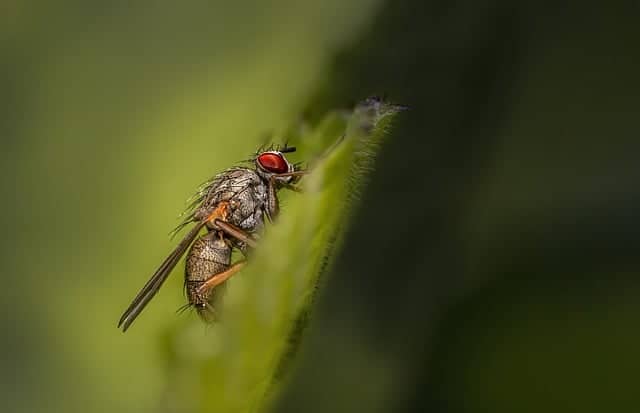Fruit flies are tiny insects that are commonly found in homes, especially in areas where there is ripening fruit or vegetables. While they are not harmful to humans, they can be a nuisance and can quickly multiply, leading to an infestation. One of the common questions people have about fruit flies is whether they lay eggs in plants.
Fruit flies are known to lay their eggs in a variety of materials, including fruits, vegetables, and even drains. However, they can also lay their eggs in the soil of potted plants. This is because the damp soil provides a suitable environment for the eggs to hatch and for the larvae to feed on the decaying organic matter in the soil.
Understanding the breeding habits of fruit flies is important in preventing an infestation. By knowing where they lay their eggs and how they reproduce, homeowners can take steps to control and prevent fruit fly infestations in their homes.
In this article, we will explore in more detail whether fruit flies lay eggs in plants and what homeowners can do to prevent and control fruit fly infestations.
Key Takeaways on Do Fruit Flies Lay Eggs in Plants?
- Fruit flies are known to lay their eggs in the soil of potted plants.
- Understanding the breeding habits of fruit flies is important in preventing an infestation.
- Homeowners can take steps to control and prevent fruit fly infestations in their homes.
Check out these other popular posts in this category:
- Do Air Plants Bloom More Than Once?
- Can You Use Ortho Home Defense on Plants?
- Can You Use Cactus Soil for Regular Plants?
Understanding Fruit Flies
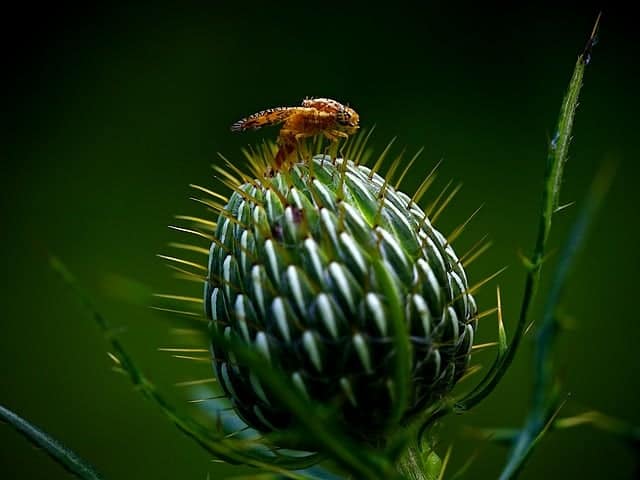
Fruit flies are small insects that belong to the family Drosophilidae. They are commonly found in homes, restaurants, and markets where they feed on ripe and decaying fruits and vegetables. The most common species of fruit flies is Drosophila melanogaster, which is about 1/8 inch long and has red eyes.
Fruit flies are known for their rapid reproductive rate. Females can lay up to 500 eggs in their lifetime, which hatch into larvae within 24 to 30 hours. The larvae, also known as maggots, feed on the fruits within which they were laid.
Within one week, maggots burrow through the decaying matter and molt. After five to six days, larvae move to a dry surface and transform into pupae. A few days later, adult fruit flies emerge.
Fruit flies are attracted to moist areas where they can lay their eggs. They are commonly found in areas with fermenting or decaying organic material, such as ripened fruits and vegetables, juice and alcohol spillage, drains, trash items, dirty mops, and cleaning rags. They are also attracted to plants that are overwatered or have decaying roots.
While fruit flies do not lay eggs in plants, they can be a nuisance to gardeners. Fruit flies are attracted to overripe or damaged fruits and vegetables, which can lead to an infestation in the garden.
To prevent fruit flies from entering the garden, it is important to remove any ripe or damaged fruits and vegetables and to keep the garden area clean and free of decaying organic material.
The Life Cycle of Fruit Flies
Fruit flies are small insects that can be found in homes, gardens, and orchards. They are attracted to fruits, vegetables, and other organic matter. Fruit flies have a short lifespan, but they reproduce quickly, making them a nuisance for homeowners and farmers alike.
Life Cycle
The life cycle of a fruit fly consists of four stages: egg, larva, pupa, and adult. Female fruit flies can lay up to 500 eggs over the course of their relatively short lifespan, around 5 at a time.
The eggs are about 0.5 mm long and are laid on the surface of fruits, vegetables, and other organic matter. The eggs hatch within a day or two, depending on the temperature and humidity.
After hatching, the larvae emerge from the eggs and begin to feed on the organic matter. The larvae are small, white, and legless, and they grow quickly. They molt twice during this stage, shedding their skin as they grow.
The larvae stage begins when the eggs hatch and the larvae emerge. During this stage, the larvae feed on decaying organic material and other foods such as fruits and vegetables. The larvae need the right environmental conditions to grow, such as adequate moisture and oxygen levels.
The pupa stage is when the larvae transform into adults. The pupae are usually found in the soil or in other protected areas. During this stage, the pupae do not feed, but they undergo metamorphosis, transforming into adult fruit flies. After a few days, the adult fruit flies emerge from the pupae, ready to mate and lay eggs of their own.
Female Fruit Flies
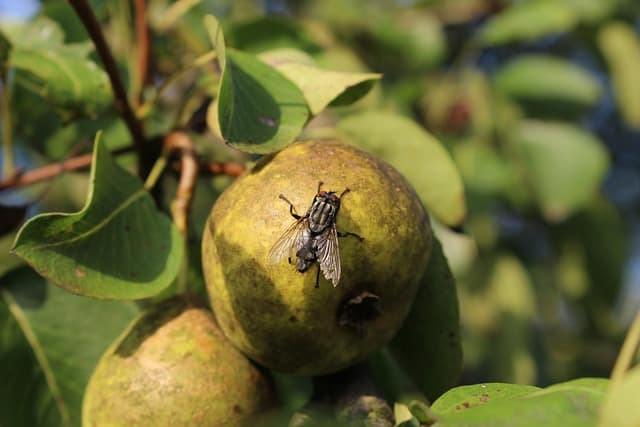
Female fruit flies play a critical role in the life cycle of fruit flies. They are the ones that lay the eggs, and they can lay up to 500 eggs during their lifespan. Female fruit flies are capable of mating and laying several batches of eggs in that time, allowing the fruit fly population in a home to multiply quickly.
Lifespan
The average natural lifespan of fruit fly adults in optimal temperatures is 40 to 50 days. Fruit flies enjoy a lifespan of about 40 or 50 days and have been known to lay up to 500 eggs during that time.
Breeding Habits of Fruit Flies
Fruit flies are known for their rapid breeding habits. Female fruit flies can lay hundreds of eggs within their brief life spans. They typically lay their eggs on moist, organic materials or near the surface of fermenting food. After fruit fly larvae emerge from eggs, they feed on the decaying matter.
Fruit flies prefer damp environments, which can include damp soil, overripe fruit, and fermenting fruits and vegetables. They are also attracted to ripe bananas and other fruits that have begun to decompose. In addition to fruits and vegetables, fruit flies can lay their eggs in plants and soil.
When it comes to breeding, fruit flies tend to lay their eggs in areas where there is a thin layer of fermenting material that is moist to the touch. These areas can include ripened and fermenting fruits and vegetables, juice and alcohol spillage, drains, trash items, dirty mops, and cleaning rags.
The breeding cycle of fruit flies begins with the female laying eggs on the surface of moist, organic materials such as fruits, mushrooms, sap fluxes, and other decaying matter. Female fruit flies can lay up to 500 eggs over the course of their relatively short lifespan, around 5 at a time. The eggs are about 0.5 mm long.
In conclusion, fruit flies are attracted to damp environments and prefer to lay their eggs on moist, organic materials. They can lay their eggs in plants and soil, as well as in overripe and fermenting fruits and vegetables.
To prevent fruit fly infestations, it is important to keep fruits and vegetables stored properly and to clean up any spills or damp areas in the home.
Fruit Flies and Plants
Fruit flies, also known as vinegar flies, are attracted to decaying organic matter. While they are most commonly associated with rotting fruits and vegetables, they can also lay their eggs in the soil of potted plants and garden beds.
When fruit flies lay their eggs in the soil, the larvae hatch and feed on the decaying organic matter in the soil, including plant roots. This can cause damage to the plant and even lead to its death in severe cases.
Houseplants are particularly vulnerable to fruit fly infestations since they are often kept in warm, humid environments that provide ideal conditions for fruit fly breeding. In addition, houseplants can attract other pests like aphids, which produce honeydew that fruit flies feed on.
To prevent fruit fly infestations in plants, it is important to keep the soil in pots and garden beds clean and free of decaying organic matter. This can be achieved by removing any dead leaves or plants, and regularly aerating the soil to promote drainage.
In addition, it is important to monitor plants for signs of aphid infestations, as these pests can attract fruit flies. If aphids are present, they can be controlled using insecticidal soap or neem oil.
Fruit Flies Infestation
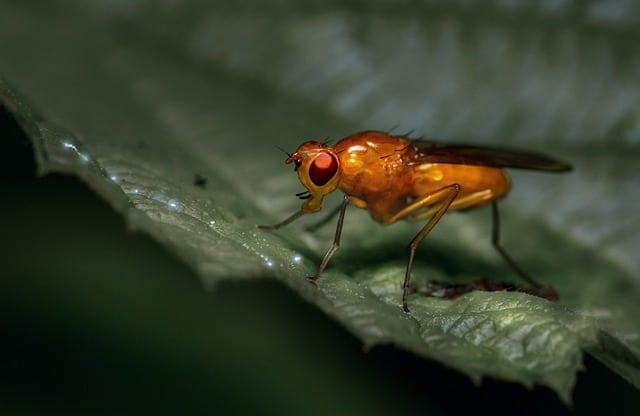
Fruit flies are a common household pest that can be found in many areas of the home, including the kitchen, drain, garbage disposal, sink drains, trash cans, and garbage disposals. They are attracted to overripe fruits and vegetables, as well as other organic material, such as decaying plant matter and moist soil.
A fruit fly infestation can be a nuisance, as these pests can quickly multiply and become a significant problem. Female fruit flies lay their eggs on the surfaces of decaying fruits and vegetables, as well as in moist soil. They can lay up to 500 eggs at a time, and their larvae can hatch within hours.
To prevent a fruit fly infestation, it is important to keep the kitchen clean and free of rotting fruits and vegetables. It is also essential to dispose of garbage regularly and keep sink drains and garbage disposals clean. Fruit flies can breed in these areas, so it is essential to keep them free of organic material.
If a fruit fly infestation is already present, there are several methods to get rid of them. One popular method is to create a vinegar trap. To do this, fill a small bowl with apple cider vinegar and add a few drops of dish soap. The fruit flies will be attracted to the vinegar and will become trapped in the mixture.
Another method is to use a homemade fruit fly trap. To make this trap, fill a jar with a mixture of apple cider vinegar and a few drops of dish soap. Cover the jar with plastic wrap and poke several small holes in the top. The fruit flies will be attracted to the vinegar and will become trapped inside the jar.
Fruit Flies and Food
Fruit flies are attracted to ripe, overripe, and rotting food. They lay their eggs on the surface of fermenting (ripening) organic materials like fruits and vegetables. Females typically lay between 500 and 1,000 eggs, and the eggs hatch within 24-30 hours.
Fruit flies are often brought indoors on fresh produce like bananas, tomatoes, and onions. They can also lay their eggs in sink drains, garbage disposals, empty bottles and cans, garbage bags, and even damp mops and sponges.
To prevent fruit flies from laying eggs on produce, it is important to store fruits and vegetables in the refrigerator or airtight containers. It is also important to dispose of overripe or decaying matter promptly and to keep kitchen surfaces clean and dry.
If fruit flies have already infested produce, it is best to dispose of the affected items. It is also important to clean and sanitize any surfaces or containers that may have come into contact with the infested produce to prevent further infestations.
Prevention and Control Measures
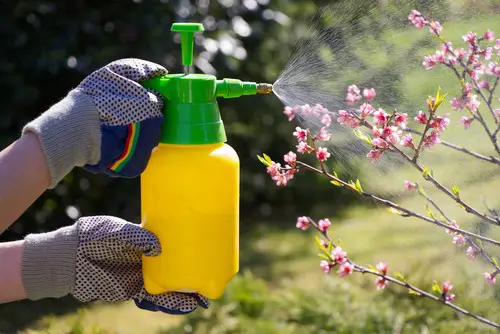
Preventing fruit flies from laying eggs in plants is crucial to keep them from reproducing and causing an infestation. Here are some effective prevention and control measures:
1. Sanitation
Sanitation is the key to preventing fruit flies from laying eggs in plants. Keeping the kitchen clean, sorting through ripening fruits regularly, and refrigerating produce if possible can help minimize available surfaces for these flies to breed on. Chilling also slows or stops larval development, giving you an opportunity to control the infestation.
2. Traps
Placing traps around the plants can help catch adult fruit flies and prevent them from laying eggs. Vinegar, cider, or apple cider vinegar are effective baits for fruit fly traps. You can also use alcohol or beer to attract and trap fruit flies. Aunt Fannie’s FlyPunch is a popular product that uses natural ingredients to attract and trap fruit flies.
3. Seal Doors and Windows
Sealing doors and windows can help prevent fruit flies from entering the house. Make sure that screens are in good condition and that there are no gaps or holes that can allow fruit flies to enter.
4. Clean Mops and Rags
Mops and cleaning rags can harbor fruit fly eggs, so it is important to clean them regularly. Use hot water and soap to clean them thoroughly, and make sure that they are completely dry before using them again.
5. Refrigerate Produce
Refrigerating produce can help prevent fruit flies from laying eggs on them. Make sure that the fruits and vegetables are completely dry before storing them in the refrigerator.
6. Use Insecticides
Insecticides can be used to kill adult fruit flies and prevent them from laying eggs. However, it is important to use them safely and according to the instructions on the label. Fly traps that use light to attract and kill fruit flies are also effective.
Fruit Flies and Health Risks
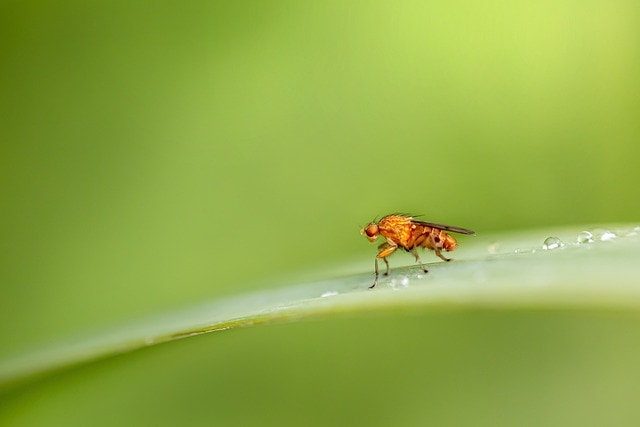
Fruit flies are not only annoying but can also pose health risks to humans. These tiny insects are known to carry harmful bacteria such as salmonella, which can cause food poisoning. They can also spread other types of bacteria that can lead to serious infections.
When fruit flies land on food, they can easily transfer bacteria from their bodies to the food. This can happen even if the food appears to be clean and safe to eat. Consuming contaminated food can cause symptoms such as diarrhea, fever, and abdominal pain.
In addition to spreading bacteria, fruit flies can also cause allergic reactions in some people. These reactions can range from mild to severe and can include symptoms such as itching, swelling, and difficulty breathing.
To reduce the risk of health problems associated with fruit flies, it is important to take steps to prevent infestations. This can include keeping food covered, cleaning up spills and crumbs promptly, and disposing of overripe or rotting fruits and vegetables.
Conclusion
Fruit flies can lay eggs in plants under certain conditions. Fruit flies are attracted to organic matter, including overripe produce, compost, and decaying plant matter. They are especially common during late summer and fall when fruits and vegetables are ripening and fermenting.
Fruit flies are small, yellowish-brown or brownish-black flies that can be found in grocery stores, trash bags, and near compost bins. They are attracted to the sweet smell of overripe produce and can quickly reproduce, leading to large populations in a short amount of time.
To prevent fruit flies from laying eggs in plants, it is important to keep the area clean and free of decaying organic matter. This can be done by disposing of empty bottles and cans, using trash bags with tight-fitting lids, and covering produce with plastic wrap and a rubber band.
If fruit flies are already present, there are several methods for getting rid of them, including using a fly swatter, boiling water, and creating a trap using a mixture of vinegar and dish soap. It is important to eliminate fruit flies in batches to prevent them from reproducing and increasing their populations.
While fruit flies can be a nuisance, they play an important role in decomposition and the growth of fungi. The most common species of fruit flies is Drosophila melanogaster, which has been extensively studied in genetics and developmental biology research.
Frequently Asked Questions
Where do fruit flies lay eggs on plants?
Fruit flies lay their eggs on the surface of overripe or rotting fruits and vegetables. They may also lay their eggs on moist soil or decaying organic matter around the plants. The eggs hatch into larvae, which feed on the decaying matter and can cause damage to the plant roots.
Can fruit flies come from my plants?
Yes, fruit flies can come from plants that have overripe or rotting fruits or vegetables. They can also come from moist soil or decaying organic matter around the plants. It is important to keep the area around the plants clean and free of any decaying matter to prevent fruit flies from breeding.
Do flies lay eggs in potted plants?
Yes, fruit flies can lay their eggs in potted plants that have overripe or rotting fruits or vegetables. They can also lay their eggs in moist soil or decaying organic matter in the pot. It is important to keep the pot and the area around the plant clean and free of any decaying matter to prevent fruit flies from breeding.
What do fruit fly eggs look like in plants?
Fruit fly eggs are small and yellowish-white in color. They are about 0.5 mm long and are usually laid in clusters of up to 500 eggs. The eggs are usually laid on the surface of overripe or rotting fruits and vegetables.
How Do I get rid of fruit flies in plants naturally?
One natural way to get rid of fruit flies in plants is to use apple cider vinegar traps. To make the trap, fill a small bowl with apple cider vinegar and add a few drops of dish soap.
The fruit flies will be attracted to the scent of the vinegar and will drown in the solution. Another natural way is to use a mixture of water and neem oil. Spray the mixture on the plant leaves and soil to repel the fruit flies.
What is the fastest way to get rid of fruit flies from plants?
The fastest way to get rid of fruit flies from plants is to remove any overripe or rotting fruits and vegetables from the plant and the surrounding area. Clean the area around the plant and the pot thoroughly to remove any decaying matter. Use apple cider vinegar traps or neem oil spray to repel or kill any remaining fruit flies.

Hey, I’m Lisa and I’ve been an avid gardener for over 30 years. I love writing, talking and living in the garden! Feel free to connect with me on my socials below

